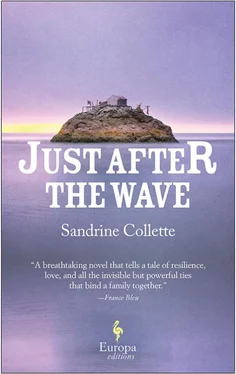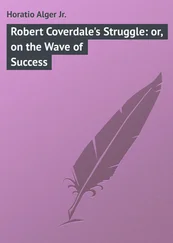“Untie the boat. Let’s go.”
Louie unties the rope, jumps into the boat next to Ades. He can sense the man’s indifference with every pore of his skin, he knows that for Ades they do not exist, not Perrine or him or even Noah, who took to him right away, they are nothing to him, they will not even weigh on his conscience.
During the first minutes in the boat everything opposes them, the little boy and the thief: one who is gradually shrinking, tiny and defeated, and the other filling the air with the rhythm of his powerful, regular breathing, taking the boat to the island, toward salvation, his heart swelling with a fierce joy. This time Louie begs the storm to come, even if it capsizes them, even if they lose their crop, and if he has to lose his life, too, he is prepared to do so; but he cannot watch Ades strip them down to their last egg, their last pancake, and climb into the boat and row away to high ground without them. Louie prays in silence and the sky is still blue, the sun burning his arms and his neck, the sea more polished than a sheet of steel. If he looks straight ahead he can already see their hill, where Perrine and Noah are waiting. If he turns around, he can still see the island where the useless potatoes will rot, and wherever his vision takes him, it is incredulous and petrified, he no longer believes in Pata’s return. But this doesn’t bother Ades, who is monumental and vile, untouchable Ades getting to his feet, causing the boat to rock, handing Louie the oars.
“Your turn.”
Without a word Louie does as he is told, does not try to cry out or protest that he is tired, when he has just dug up three sacks of spuds while Ades sat there smoking by the side of the potato patch—since there’s nothing for it, he takes the paddles, settles into the middle of the seat, dips the wood into the water, and pulls with his arms. Ades faces the sea and unbuttons his trousers with a laugh.
Louie hears the stream splashing into the water.
An instinct: he looks.
A flash that makes his heart race. Ades has his back to him.
Don’t think. No time. Already his hands are trembling.
On his feet in the split second that follows, with all his might he slams the oar into the man’s head.
“He drowned,” says Louie in a quiet voice.
His siblings look at him, stunned; Louie with his hands still throbbing. He has just landed on the island.
Alone.
They didn’t say anything, it was just the way they looked at him.
And Louie murmured, He drowned .
They wait.
He drowned is not enough. So Louie adds:
“The boat turned all of a sudden. He fell overboard.”
Silence courses between the three of them, between their questioning eyes and the words they don’t dare to say. Louie won’t tell them the rest of the story.
How the bones cracked when the oar hit Ades from behind, half knocking him out and pitching him into the sea, or the sound of the water opening to take in his heavy body, a huge, dull sound, like a rock falling from a cliff, or so it seemed to him. Louie cried out. Ades raised his arm, and as mad as it might seem, at that moment the boy lay across the edge of the boat to hold the oar out as far as he could for the man to grab, to fish him out again, to save him, yes. He even felt the vibration of Ades’s fingers on the flat surface of the wood, a long scraping motion, that left a trace on the oar—until he began to splutter and wave his arms, sinking into the water up to his mouth, his eyes rolling backwards in shock and the gash on his head bleeding profusely, until Louie realized that Ades didn’t know how to swim, and he scrambled backwards in the boat with a scream.
If he saves Ades, Ades will kill him.
Not for one moment did he think he could ever be the winner in this strange combat. When he hit him, he didn’t really believe in it. He was convinced Ades would reach up and stop his gesture; he simply tried.
It was instinctive, as always. To act as quickly as possible so Ades wouldn’t have time to sense the movement behind his back—quicker than any intuition of motion in the air, in the rhythm of the oars, in the sound of oars tearing through water.
But even then Louie couldn’t believe it. Not with an opponent like Ades.
And then.
And so, gripped by panic, convinced the man was going emerge like a madman from the gray waters to come back to the boat and grab the edge, Louie reached for the oars. And his fear just as he dips them into the water: what if Ades grabs them from beneath the surface, and pulls, and leads him away. Louie rows, then pauses, looks all around him, his heart pounding.
Not pounding: racing, skipping, a little animal gone mad with a fear that has made him breathless, after a few yards he has to stop and sit there without moving, unable to breathe; and what if this is dying.
Wait.
Madness.
He ought to row fit to tear his arms out, to get away, beyond reach.
He can’t.
He bends double, begs his heart to start beating again, he can see the ripples, too near. He doesn’t know if he’ll have the strength to strike again. All he can do is tremble.
Over there, four or five oar lengths away, Ades is still struggling.
Not as violently.
Louie can see his arms waving, his hands reaching out of the sea as if to grab hold of something, but now there is only air, since the boat has moved away, a little air, not enough, and spluttering, hoarse, stifled cries, a lament like that of the horns of ships lost in the fog. Louie wants it to stop, he blocks his ears, weeping.
Gradually they diminish, the eddies, and the foam tossed up by Ades’s contortions. Gradually the water grows calmer, engulfing to its depths the big powerful body and the terrible voice.
Closes over completely.
Louie shivers relentlessly in the sun. He murmurs, I’m sorry, I’m sorry .
And then his heart starts to beat again.
He waits some more.
What if Ades comes up again from the sea.
After a long while he reaches for the oars and moves away, turning around often to make sure, both sick with remorse and terrified at the thought that Ades’s body might be following him, gliding under the water. Until he lands on the island where Perrine and Noah are mute and stunned to see him there alone, he is afraid some shape, some beast will cling to the boat and capsize it.
In his dreams that night, Ades becomes a huge seething wave, tearing after him across the ocean. His cries wake Perrine and Noah. The three of them sit under the tent made of sheets and silently nibble the last of the pancake; fatigue and insomnia are a thousand times better than Louie’s screams, which still make their hair stand on the end.
* * *
“We’re going to leave,” says Louie.
The three of them look at the boat.
“Do you think we’ll be strong enough?” asks Perrine.
“There are still some cans of fuel in the barn. We’ll get the motor going, that’ll mean we can go ten times faster.”
“Will we have enough?”
“I don’t know. And after that, anyway, we can row.”
They look at the boat again.
“I’m scared,” says Noah.
“Ades came in this boat, didn’t he?”
“I’d rather he were here with us.”
“You idiot, don’t you understand he was going to leave us here to die?”
The little boy lowers his eyes.
“Come on,” says Louie encouragingly, patting him on the shoulder. “We’ll take all the supplies we can.”
They spend the morning getting ready, somewhat feverishly; what if they forget something important.
Water. Food.
Blankets, even if it’s hot, and a tarp for the rain.
Louie looks behind him. He says, The hens .
Читать дальше












